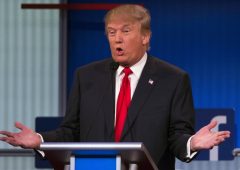SEC Fines Wall Street Firms $63 Million for Recordkeeping Violations
19.01.2025 19:00 1 min. read Kosta Gushterov
The U.S. Securities and Exchange Commission (SEC) has fined a dozen Wall Street firms a total of $63.1 million for using unauthorized communication methods that violated federal recordkeeping laws.
Employees, including managers, were found to have relied on unapproved platforms to exchange work-related messages, and firms failed to enforce adequate oversight to prevent such practices.
Prominent names such as Charles Schwab, Santander, and Blackstone are among the penalized firms. The fines include $12 million for Blackstone, $11 million for Kohlberg Kravis Roberts & Co., $10 million for Charles Schwab, and $8.5 million each for Apollo Capital Management, Carlyle Investment Management, and TPG Capital Advisors. Santander was fined $4 million, while PJT Partners, which self-reported, paid $600,000.
In addition to financial penalties, the SEC has issued censures and mandated that these firms overhaul their compliance protocols to address deficiencies. Acting SEC Enforcement Director Sanjay Wadhwa stressed that failures in recordkeeping compromise market transparency and integrity, emphasizing the importance of adherence to these regulations.
The affected firms have agreed to enhance their internal procedures to prevent future violations, aiming to restore compliance and trust in their operations.
-
1
Nvidia Surges as Barclays Sees $200 Target on Blackwell Momentum
18.06.2025 11:00 1 min. read -
2
Gold Glides Toward New Peaks as Middle-East Strife Lifts Safe-Haven Demand
15.06.2025 10:00 2 min. read -
3
a16z Backs EigenCloud Launch With Fresh $70M Token Buy
18.06.2025 14:00 1 min. read -
4
Bybit Steps Into DeFi With Solana-Based Platform
16.06.2025 17:00 1 min. read -
5
Ripple’s Stablecoin Gains Global Reach Through Alchemy Pay Integration
18.06.2025 8:00 1 min. read
What’s Driving July’s Crypto Conversations, According to Santiment
According to Santiment’s latest narrative dashboard, the start of July has seen a surge in online discussions around a wide range of crypto themes, with Solana ETFs, stablecoins, Virtuals, Robinhood, and AI bot projects like Yapyo & Kaito leading the spike in mentions across platforms.
Market Odds of a U.S. Recession in 2025 Drop in Half Since May
The likelihood of the United States entering a recession in 2025 has dropped significantly, according to the latest market data from prediction platform Polymarket, where recession odds have fallen to just 22%, marking a notable decline from earlier highs in April and May.
Majority of U.S. Crypto Investors Back Trump’s Crypto Policy, Survey Finds
A recent poll reveals that over 70% of U.S. crypto investors support President Donald Trump’s current approach to digital asset policy, reflecting growing optimism within the sector.
Donald Trump Signs “One Big Beautiful Bill”: How It Can Reshape the Crypto Market
U.S. President Donald Trump has officially signed his sweeping policy bill into law, enacting one of the most consequential pieces of legislation of his presidency.
-
1
Nvidia Surges as Barclays Sees $200 Target on Blackwell Momentum
18.06.2025 11:00 1 min. read -
2
Gold Glides Toward New Peaks as Middle-East Strife Lifts Safe-Haven Demand
15.06.2025 10:00 2 min. read -
3
a16z Backs EigenCloud Launch With Fresh $70M Token Buy
18.06.2025 14:00 1 min. read -
4
Bybit Steps Into DeFi With Solana-Based Platform
16.06.2025 17:00 1 min. read -
5
Ripple’s Stablecoin Gains Global Reach Through Alchemy Pay Integration
18.06.2025 8:00 1 min. read


